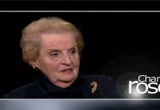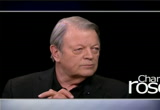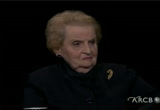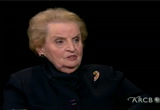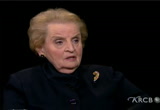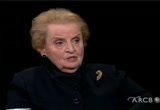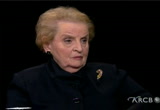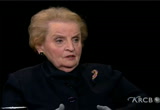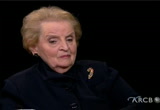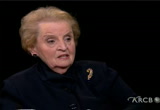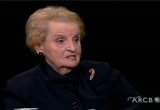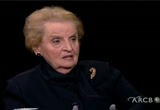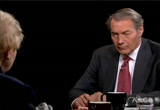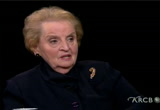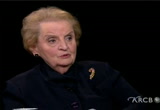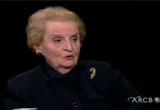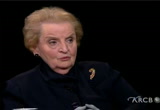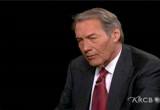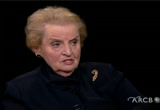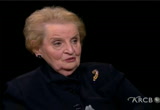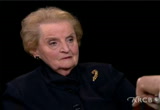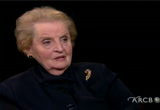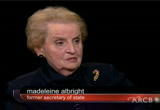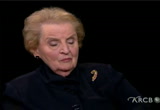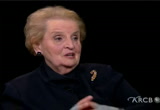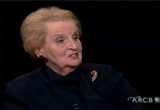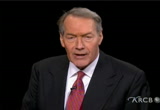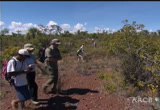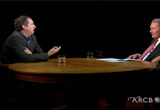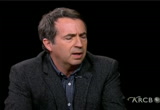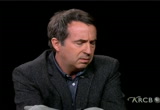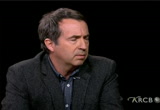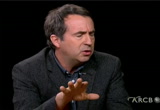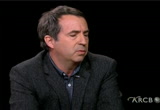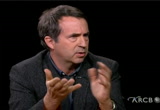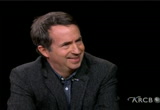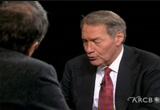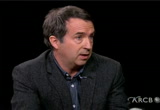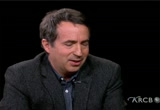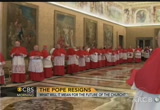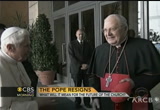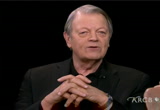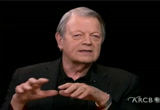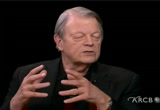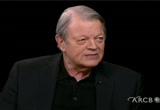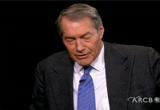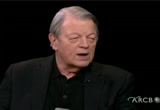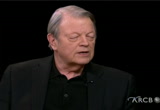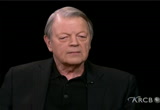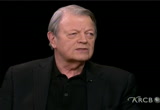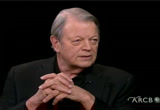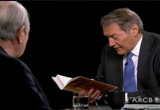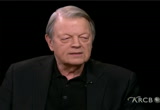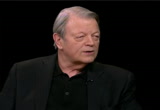tv Charlie Rose PBS February 20, 2013 11:00pm-12:00am PST
11:02 pm
>> rose: welcome to the program. tonight, a conversation about syria and other hot spots with madeleine albright, the former secretary of state of state. >> did i ever think that would become friends with vaclav havel? we became really, really good friends. and there have been a whole period that i up in the united states when people were looking at what was going on in central and eastern europe and the hungarians would have revolutions and the poles would have revolutions and the czechs had only a small thi in 1968. then vaclav havel appears on the scene and he is somebody that kind of restored the moral authority of the country and made people feel proud of their background and he was kind of the philosopher king. >> rose: about saving turtles with eric goode the entrepreneur
11:03 pm
restaurateur and founder of the turtle conservancy. >> it's hard to generalize. in the case of the plow share tortoise it comes from a tiny geography, there's maybe a few hundred left in the world. it's rarer than a panda bear. d these animals tend to slip through the cracks and so what i'm trying to do is protect it in the wild and we've hired guards and done a number of things. i don't know if it's working. we also work on breeding in the madagascar. >> rose: is that working? >> that is working. >> rose: we conclude with garry wills, he is the author of a new book called "why priests? a failed tradition." he also talks about the roman catholic church today and the election of a new pope. n't i would not say get rid of priests because they're very od comnity brothers in christ let them teach, let them study bible, let laymen do it, too. but don't say they are the exclusive channels of grace.
11:04 pm
don't say well there's no sense coming to church if a priest isn't there to consecrate. don't say "i'm the only person who can forgive your sin, i, the priest." the priesthood in that sense is very divisive, very -- often punitive. >> rose: madeleine albright, eric goode and garry wills when we continue.
11:05 pm
captioning sponsored by rose communications from our studios in new york city, this is charlie rose. >> rose: madeleine albright is here. she was secretary of sta fro 1997 to001. her approach to american foreign policy was marked by a muscular commitment to the ideal of democracy. her story began in far away lands, she was born in czechoslovakia before the start of world war ii. she looks back at her childhood in her latest book called "prague winter: a personal story of remembrance and war." the paper back version is just out. i am pleased to have her on this program. welcome. >> wonderful to visit you. thank you. >> rose: you told me about this wonderful organization that you have started which is called --
11:06 pm
which is all about the former foreign ministers around the world. >> it's sponsored by aspin, it's the aspin foreign ministers forum we its unofficial name is madeleine and her exes. >> rose: (laughs) >> and we meet a couple times a year talk and share a lot of experience. i have a business, i have a global consulting firm and i teach at georgetown and i'm chairman of the board of the national democratic institute which is something that was started in the '80s bronald reagan. >> rose: tell me what you think the test in syria is. >> i think the test is ultimately what happens for the syrian people. whether they will be able to live a way that they can have freedom, their economic life improves and that they -- it's really about the syrian people,
11:07 pm
so that's one test. the other, frankly, charlie, is what happens in the region because partially the syria story is also a story that afcts jordan and turkey and lebanon and the region generally. and it's a complicated story of sectarian fighting and also a fight between the sunnis and shi'as so there's an awful lot of things going on there. >> rose: so what should the world do? >> i think that the world does have to have an influence on what happens. and i think that what we should all be doing is trying to figure out how to help the syrian people. how to deal with the problems of the refugees. how to make sure that this does not spread into a region that's already very complicated and i think operate multilaterally. either with the united nations or also with some kind of ad hoc coalition and support those opposition groups that are working together to try to bring
11:08 pm
an end to what assad has been doing to them. >> rose: as you remember from the balkans, people used to say that history would judge the world's outside powers badly if they did not do something. that thereas aoral imperative. is this similar? >> i feel that way. i think -- the question is what, however. and i do think that the international powers are doing quite a lot in terms of humanitarian assistance. the united states, for instance, has provided something like $50 million in humanitarian assistance. has been supporting the various groups to unite and give them -- recognize them, frankly. and then also try to be helpful in finding some kind of a diplomatic solution to this. i think t ral issue comes down to what kind of military action and not every place is amenable to having some kind of military action. >> rose: is syria?
11:09 pm
>> in syria i think that we have to keep examining trying to figure out what can be done. i think it's hard, charlie, i really do. >> rose: secretary of state clinton, who you worked with, panetta petraeus, all recommended we do something. and the president said no, and you say the president was right to say no and other people can asthis qestion: how many syans ve t die before the west does something? >> well, i think this has to constantly be reexamined. as i understand it, the president is looking at things again. trying to figure out -- i talk about something called-- i made this up-- the doability doctrine. >> rose: right. >> can we really make a difference? and i know some people have compared it to the we did something military in libya with nato. very different kind of situation because the libyan army basically didn't exit. the question is whether there's value in creating a nfly zone. etr it would really do something useful. whether -- the questions i would
11:10 pm
ask is whether the assad military regime has been weakened so that in fact there can be a functional no-fly zone. the other question i would ask is how many arms are needed there? as i understand it, there have been a provision of arms by other countries and i think it isn't just a matter of adding arms but doing something that will make it possible for the opposition groupto take power and to recognize that it's over. >> rose: people are asking -- the longer you delay the more the people who are part of the rebels who do not necessarily act in american interest. >> well, i think that there is the question as to whether the rebels have been penetrated by some group that is not friendly to the united states. >> rose: well, clearly there are people fighting on their side. >> i would like to see us do more. that's -- i'm an activist, i believed it, i did hit in the balkans. i don't have access to all the
11:11 pm
materialf pople that are in office. i also don't quite know what it is that the secretaries and the general petraeus suggested. i do have a lot of confidence in the president and i think that he ultimately has to make a decision. what i think what is important is that they are relooking, as i understand it, as what can be done, what needs to be done. exactly so as not to arrive at the position you're talking about. i think they're very much aware of that. i think also secretary kerry is very interested in whatis going on. he's going generally into the region. i think he understands the issue and i think that this is an evolving situation. >> rose: benghazi. what happened? >> i think that what happened was that this was a dangerous place to be that, in fact, there's been an awful lot of testimony on this. secretary clinton testified, secretary panetta testified that
11:12 pm
what happened was that they thought-- and i believe this-- that they thought it was a spontaneouskind of thi that then actually there were aspects of it that had been planned. i think that they have done everything they can to sort out what happened and let me just tell you, everybody knows me knows i loved being secretary of state except on august 7, 199. >> rose: exactly. >> when our you are embassies in kenya and tanzania were blown up. same questions, what happened, did we know somewhat? what could we have known earlier and the truth is that i believe that everybody's instincts were try to figure out how to have safe places for our ambassadors to be. but this was not an embassy. it wasn't even a full consulate and i think that the state department and this review board has done an incredible amount to figure out what happened and it should not be-- i fully believe this, charlie-- this cannot go
11:13 pm
on being a political football. it's not a matter of the administration not turning over huge amounts of documents or being available to answer questions from the secretary on down. >> rose: you have thepresident anuncing that he was going to pivot his administration toward the east and towards china and asia people-- including dick cheney who was sitting for an interview with me-- saying he worries about that because of the attention he thinks the middle east needs. is there something risk of pivoting to china? >> pivot was an unfortunate word. rebalancing in some ways. we are an atlantic to pacific power. this might have been a joke but somebody said to me "what are you going to do about west asia?" i thought whatis st asia it's the middle east. so the fact that the president is now going to israel and as i
11:14 pm
understand it he may go to ramallah. so i think it's not going to be any lack of attention on the middle east. certainly secretary kerry is going and so i think we are capable of doing both. >> rose: what should the president hope to achieve in his visit to israel? >> well, i think that what he wants to -- he's not going with a plan as i understand it. >> rose: he wi have an agda in hisind. >> well, i think his agenda is obviously some israeli/palestinian discussions but also kind of looking at what this situation is with syria, what this situation is with iran to have a face-to-face discussion with our close ally the israelis and look at the area as a region and i think kind of maybe take the temperature a little bit in terms of what is doable. but as i understand it he's not going who w a plan or an american initiative. butbviously getting thgs going a way where he can be listening. >> rose: some say they need an
11:15 pm
american plan. >> well, i think there's a real problem having been there, done that, in terms of ultimately the americans could put down plans, but unless the parties buy into it nothing is going to happen. and so there has to be a way that it is in the best interests of the israelis and the palestinians to make a deal. i so believe in a two-state solution. i -- >> rose: and do you think it's at risk now because of demographichange and because stlemen and lots ofor things? >> well, i think the demographic change actually works more towards a two-state solution because the demographic change if they were one state of israel with the -- the demographics don't work in favor of there being a jewish states which what the israelis are dedicated to having. so i don't think that particularly works. i do think that there is the settlements as has been said over and over again obviously
11:16 pm
makes it more complicated. re: let's do some history, too. >> okay. >> rose: here it is, paper back. why did you call it "prague winter"? >> because the story is basically about my choke slovak background and prague as the center of a lot of events that took place before and during the war. and the winter because obviously opposite of spring which is what people now think about prague in terms of the prague spring and the velvet revolution. but there were two very bad winter,, very specifically. kind of thinter of '38-'39 when the munich agreement took place and the nazis marched in to prague in march, '39. and the winter of '47-'48 when, in fact, the communist coup happened in february '48. and there were lots of attacks and various events that took place that in period and then -- so they were two pretty tough and cold times in the history of
11:17 pm
czechoslovakia. >> rose: and what would have made a difference? >> well, i think in the first ca what would have made a difference is czechoslovakia was a brand new country created in 1918 as a result of woodrow wilson, basically, and world war i and a country that was a functioning democracy. at the same time it was an ethnically mixed country. there weren't just checks and slovaks but there were a lot of germans that lived in the northwest part and they in many ways were, i think, kind of propagandized by someeopleto thinthat ty should be a part of the german rooik. and at the same time as we know hitler began to move out and saarland joined austria and czechoslovakia was the subject of discussion between the
11:18 pm
british and french and then with the germans and italians. and what should have happened is that it shouldn't have been sold down the river. >> rose: exactly. but do you also believe that if the west had listened to winston churchill earlier they could have stopped hitr in his tracks? i do. i think that winston churchill had said a number of very important parts about hitler. but the part that i finally understood better -- i mean, i grew up with munich as a continent-- was how tired the british and french were after world war i. they had lost a lot of people and neville chamberlain that i put into the category of among the most odious people did anything he could. and he also said "why should we care about people in far away places withnpronounceable names." so thiwas so sml country and they thought let's just give it away and see if we can kind of quench the appetite of hitler. and yet they basically gave away a country and it was the opening
11:19 pm
of world war ii. >> rose: we do have people here today in the united states after too long wars saying we have a lot of problems at home, we should fix those problems, first >> i obviously disagree with the end -- the conclusion of that but i do agree we have very serious problems at home. i happen to think as an inteationalist we n't solve our oble at home unless we have an international outlook because of the interconnectedness of our economies, competition and so for us to all of a sudden pull up the gangplanks and worry about ourselves alone i think will bring the kind of problems that we saw before. nothing is a complete analogy, but i do think that there are some lessons learned from this. i do also believe that many americans do understand that we have a stake in what is happening inther countries. the part that i think we need to understand now is i believe in
11:20 pm
the strength of america. i think that we have a huge role to play in the world but i don't see why we have to do everything alone and so i very much agree with the approach of having partners where we can, in fact, help in other parts of the world together. that would be my shortest version of what i believe in and that i really do think while i understand the pain of people in this country ithink only solution t resolving it is for us to be active internationally with others. >> rose: one question is whether that's what the rest of the world wants. many people come here and say yes, in fact, when they talk to foreign leaders, they do not want the united states-- whether it's asia or europe or the middle east or latin america-- to pull back from exercising an important role. >> i think the rest of the world wants to see the united states. we don't want to be the policemen of the world but there are intermediate aspects of
11:21 pm
this. we -- countries wants. i can tell you, charlie, from having sat around tables where people want to know what the united states will do and how we behave with others. >> rose: at the same time, many people also say they want to have confidence that the united states will do what it says it will do as well. >> i have to say what i find very sad now-- and this won't surprise you-- is the fact that we seem dysfunctional and that we are not fulfilling what we say we will do and i think that weakens america and certainly creates probms internionally for the rest of the world and for us. >> rose: it's not only a question about our leadership but also about the political leadership? the country, isn't it? >> i think very much so. what troubles me a lot is that at this stage there's not a lot of confidence in any institutions. it's true in this country and it's true internationally. so one of the things we started talking about the former foreign ministers, what we talk about is
11:22 pm
what can be done to restore confidence in a variety of international institutions, whether it's the united nations or nato or the european union or ean whatever, it's going on everywhere. and we need to be more creative about working together. >> rose: let me ask. what influence did zbigniew brezezinski of v on you? >> a lot. he was my professor at columbia. in 196 when everybody was talking about the monolithic communism, we actually had a course on -- it was diverse communism. what were the different communist systems doing? fascinatingourse. completely brilliant man. then he was my boss when i went to the national security council. so he's had a big influence on me. we don't agree on everything but i think he's one of the truly remarkable thinkers. >> rose: who else is in that group of truly remarkable
11:23 pm
thinkers? >> i think do obviously henry kissinger is. he's unique. >> rose: why is he unique? >> because i think -- by the way he was very funny. he called me when i first became secretary of statend he said madeleine, you have taken away my one unique aspect which is being a refugee in the secretary of state. and i said "no, henry, i don't have an accent." >> rose: (laughs) but i think he has a great kind of world view and he expresses it well and i think he has -- >> rose: that's a different world view from brzezinski. >> very different but i have enjoyed reading and talking to both of them. and i think that there are people out there there that have good interesting ideas. >> rose: but the world is changing very rapidly. take the arab spring, what's happening in asia in terms of shifting paradigms of economic power in the last ten years. so do their ideas that were
11:24 pm
formed at an earlier time to the world we live in today? >> i think some of them do. not all of them. i think some of the aspects doing kind of balancing interests and trying to figure out how to have win-win situations, i think those things do apply. >> rose: is that what you really want? win-win? don't you want -- i mean we win and you win and we find a solution? >> exactly. and i think being involved in zero sum things is dangerous. >> rose: if we win you lose. >> right. obviously think some of us were raised in a completely different era but the bottom line is how do you balance historical knowledge with what is necessary now. >> rose: how do you find the principles that stand the test of time period. >> absolutely. >> rose: with freedom and values and democratic values and that kinds of thing. >> think that ere a alwa these issues about who's a realist and who's an idealist
11:25 pm
which i've thought is a false die commie mainly because i never could decide what i was. i had said i was a realistic idealist or an idealist realist and you need both. >> rose: here's the headline. for a second term, idealistic obama returns. >> well, what i believe is this, foreign policy is like a hot air balloon. you need the helium of ideal schism-to-get it up and you need the ballast of realism to give it a direction. i that's why ihit's a false dichotomy, you need both. >> rose: we may face sequester, what will it do to america's ability to conduct a wise foreign policy and defense policy? >> i think it will hurt us immensely. clearly in defense there are already questions as to, as i understand it, general dempsey spoke about in in terms of moving an aircraft carrier from one part of the world to another or how we have readiness. in foreign policy i can tell you
11:26 pm
the foreign policy budget of the united states is setnglike $50 billion, not that much in the overall comparison. yet it is needed not only to run our'm be sis and pay our ambassadors but also for program is be insfwauns paw eyre policy which other countries behave. foreign policy is about trying to get people to change their behavior and sometimes you need a variety of assistance programs public dip loamlysy, being able to listen. so i think it will be heard. aside om the fact as i said earlier it makes us look incompetent. i am such -- i'm a naturalized american. nothing makes me prouder than being american but at the moment we are not presenting the right image to the world in terms of what can be done when democratic and republican -- when leaders that have been elected are able
11:27 pm
to come to a solution. we are looking dysfunctional. >> rose: this is a sharp criticism of your president. >> no, i think the president is doing everythinge can. up? oh, so i's justongrs. >> i think that at this stage i truly do believe that. there is an awful lot of game playing and i think the president has offered a variety of solutions. i think he gave a great great deal speech and a state of the union and he has laid out a program and he wants to work with congress and instead there are a lot of arguments going on that i think are not moving the process forward. >> rose: this is easy. who is your favorite czechoslovakian hero? >> well, i have t say vaclav havel. >> rose: i knew you were going to say that. >> there's no question. he's -- thomas gehrig masterson was obviously -- but i didn't know him. did i think i would become friends with vaclav havel? we became very, very goods
11:28 pm
friends and there had been a whole period when people were looking at what was going on in central and eastern europe and the hung gehrings would have revolutions and the poles would have revolutions and the checks had only a small things in 1968 and then vaclav hel aearsn the scene and he is somebody that kind of restored the moral authority of the country and made people feel proud of their background. he really was kind of the philosopher king and at the same time he was such a good friend. he wrote those crazy plays and we spent a lot of time together and various things in life i was one of three people that gave the eulogy in prague. the president of the czech republic, the foreign minister and i. and i gave in the czecnd just wish it hadn't been that he was dead because there was something so morally uplifting about him and such a remarkable figure.
11:29 pm
absolutely my favorite check slovak hero. >> rose: thank you. this book is called "prague winter: my personal story of remembrance and war from 1937 to 1948." the author, madeleine albright, former secretary of state. thank you, indeed. >> thank you very much. >> rose: e.m. forester once said "one person with passion is better than 40 people merely interested." eric goode is a man with a passion. many know him as the owner of new york city hotels and restaurants like the bowery hotel and the waiverly inn but he leads another life as a protector of endangered turtles and tortoises. in 2005 he opened the turtle conservancy which is devoted to the care and breeding of these threatened animals. in a recent interview on "60 minutes" leslie stahl accompanied him on a trip to madagascar where the plow share tortoise is the fastest disappearing animal. >> this tortoise is one of the world's most indangered animals. it's the world's most endangered
11:30 pm
tortoise and it has an incredibly high price on its head. asian countries love gold and this is a gold tortoise. so literally these are like good bricks that one can pick up and sell. >> we were following the path of t poachers take landing on a deserted beach off we went on a long hike. we walked through scrub brush in blazing heat for almost an hour. >> the sun starts to go up tie too high they just disapierce. >> reporter: the once plentiful plow share popution here, he says, could be down to as few as 300 adults. >> this is where the guards are based. >> goode has helped hire around 40 locals to go out and find the tortoises before the poachers do >> we have to be on the team of many people >> line 30s feet apart. all right, let's go. >> we lined up the way police do when they search for a missing person and by midday with a lot of help we got lucky. >> they found one.
11:31 pm
>> look at that! how did you ever find it? >> wow, beautiful female. so this is a just -- a perfect perfect female. this tortoise is a crown jewel. this is a beautiful animal. >> look at her! >> you can see this incredible domed shell that's unique with this tortoise. nothing has -- no turtle has this shell, like an army helmet. this is very, very valuable tortoise. >> based on his own research, goode says a tortoise like this could sell for $60,000 in asia. >> rose: so where did this begin? >> my parents gave me a tortoise at the age of six. be careful what you give your kids. i had a love affair. >> rose: right then. wanted to collect more, see more. >> yeah and the natural world in general. i just had a real affinity to it and turtles and tortoises is what i gravitate to.
11:32 pm
>> and it just continues? >> it was a secret life what i led in my 30 plus years in new york city always sort of had that interest and it never disappeared. >>ose: what did you do? >> in the early '80s when i first made some money after opening a nightclub i bought some tortoises and i -- >> rose: bought some? >> i bought them and i had them in new york city and i -- every chance i got to travel i would go and see them in the wild and drive girlfriends crazy. so it was always there. it never went away. >> rose: and today you spend a considerable part of time just trying to save them? >> yeah because part ofy life i think i s rt of the oblebecausi would keep them and love to be around them and at a certain point i realized that these animals need to be in the wild and not for me to really keep them. i still struggle with that. now i'm trying to make a difference. it's very difficult. >> rose: because?
11:33 pm
they've become valuable and therefore there's a premium on their head? >> it's case by case. in the case of the plow share tortoise, because of its longevity, because of its scarcity it's extremely valuable and in asian cultures particular n particul peopl le it becae it's gold and they pay big money for this animal. >> rose: so what are you going to do to save it? other than promote the idea that this is a serious issue. >> extinction in general is a serious issue and i think it's one that we are facing as a -- our world is facing it in such a massive way for a variety of reasons but one is population and one is socioeconomic reasons. but it's very -- each species -- it's hard to generalize in the casof the plow share tortoise is comes from a tiny geography. there's maybe a few hundred left in the world. it's rarer than a panda bear and these kind of animals tend to
11:34 pm
slip through the cracks and i'm trying to protect hit in the wild and we've hired guards and we've done a number of things. i don't know if it's working and we also work on breeding it in madagascar. >> rose: is that working? >> that is working and i work alongside an organization called durell wildlife trust named after gerald durell and they've ne a great job of the last quarter century with that species. but it's still fragile. there was a fast 1996 where they lost half of the plow share tortoises. >> rose: one just came in --. >> in the middle of the night there was a theft. in europe and possibly japan in the u.s. these animals can go for many tens of thousands of dollars. >> rose: now the plow share tortoise was once thought to be extinct? >> it was once thoug to be extinc as are the case with many species of turtles and
11:35 pm
tortoises. >> rose: then they find something that says "no, they're not all gone." >> they were rediscovered in 1971 but prior to '97 71 only a handful had reached the western world. the species e.e.g. i don't gofy had been contracted to a tiny range and a remote part of madagascar so it was unclear if there were any left. so >> so if you had unlimited resources-- and you may as far as i kw-- >> i don't, trust me. >> rose: if you had more money could you do more? >> absolutely, sure. when you choose to protect a species it's almost like going into a war. you have to choose your battles and you have to figure out -- it's a horrible thing to say but you have to figure out where can you make a measurable difference? in the case of the plow share tortoise i thought i could make a difference. i thought the range was so small i could get my arms around it, i could get guards, ied that
11:36 pm
resources to make it work. there's other species where it's really complicated, birds that fly and how do you protect -- birds of prey or other things that are so complicated. >> rose: give me your agenda. >> good question. i -- at this point in my life i'm thrilled to be doing this and i'm blessed that i have the resources to do this. and i think i'm unique because i don't come out of the scientific world or academic world and so in some ways that's good and in some ways not so good. but in some ways it's good because i approach in the a different way, a practical way, in a very results-driven way and an unorthodox way. and my agenda is to really make a difference and try to do a few things, not a ton of things, and try to maybe focus on a few species and turn them around. one of them is a plow share
11:37 pm
tortoise. >> rose: it must be -- i mean, the idea that what you've done for them if one of them died in your protection -- >> ros it's a hu responsibility. we have some in the united states that we've brought in and that's my biggest fear. we're trying to breed them. we work in different fronts. in southeast asia on the trades, we work in madagascar and we work also in the u.s. in sort of a -- in a sense having an assurance -- sort of an insurance policy, i guess. >> rose: would this not be a problem if there were not people -- if they did not have value to people in terribles of commercial value? >> in this case, yes. by and large. there's always other pressures. this species at this gen time, that's the main threat. in the past there were fires, habitat loss, etc., etc. but in this particular case the exotic wildlife trade is taking this species to extinction. >> rose: and the turtle
11:38 pm
conservancy. >> yeah. >> rose: it's all about saving the turtles conserving the turtles. >> rose: i think that's a lot. people ask me sometimes why don't you have a wider net, say birds, marsupials, other creatures. >> rose: and they all need you. >> yeah, but i always go back to people like dian fossey. not that i'm dian fossey, but she dedicated her life to gorillas. and you can dedicate your life to one species and it takes a lifetime so this idea that we should do multiple groups of animals is just not practical so turtles, there's 330 species of tufrts; that's a lot. so we're trying to do just a few turtles. >> rose: you can name all of them? >> (laughs) by and large. there's a few species probably yet to be described but yeah. >> rose: where are most of the turtles in the world? >>any inin the u.s., actually. people don't know that. >> rose: southwest? >> southeast primarily. >> rose: really? >> florida, louisiana. we have -- north america has a
11:39 pm
lot of turtles. but southeast asia is what they call a hot spot. myanmar there's many different species, colombia in south america where you have a lot of -- >> are those governments responsive? >> you know, that's really a good question. they're -- in these countries myanmar, madagascar, media, the lack of political will with these kinds of lower forms of wildlife, lower forms of animals is -- it's pervasive. i mean, you know, a tiger maybe they care about in certain cases. or panda bear certainly in china. but when you start talking about birds or smaller vertebrates it's very hard to get a country to care about them. >> rose: is there any way that they could use all those people who trade in tortoises because they have commercial value that somehow there's something -- that you could do some kind of legalization thing that would --
11:40 pm
>> rose: well, that's a great question because that is really thinking outside the box and it's a very controversial idea to open up trade with certain species. i think it's something that has to be looked at because i think there are many methods and i think it's very important to keep an open mind, the idea of cutting off a rhino's horn with a chain saw. no one wants to do that, but that may save the rhino. and at sound so horfic. the idea of having a legal trade -- >> we saw a bit of that in lesley's film, too, cutting off something, didn't we? >> well, we were engraving, which is a similar defacing the tortoise so they can -- >> rose: in order to be able to -- >> well, in order to hopefully reduce their value so if someone came upon one they might say, hey, we want to take this because it's marked. but also -- >> rose: do you think that works? >> we don't know, we don't know.
11:41 pm
we hope so. we hope to mark all of these animals in the wil. >> rose: mark them so they can survive? >> mark them so they can survive. it's tragic. you're marking an animal that might be 150 years old, this beautiful shell. this is the longest-lived animal or one of the longest-lived animals on the planet. the plow share tortoise. >> rose: how long? >> i would -- no one really knows but i would suspect at least 200 years. so to get to that size and then to come and engrave that beautiful shell, 150 year animal 2,00 years, it's hardtor do. >> rose: how do you measure cces >> i would like to believe that we can preserve these things in the wild for the most part. in some cases we can't but with the plow share tortoise i think that would be the case. >> rose: you're doing good's work. >> we're trying, one step at a time. let's see what happens. it's so important for people to get away. >> rose: and if they want to know more about this where do they go?
11:42 pm
>> www.the turtle conservancy.org. >> rose: thank you. pope benedict xvi resigned from his post as head of the ran caolic chuh last week. hes the first phone do so in almost 600 years. benedict stated that due to his age and health he could no longer fulfill his duty. as the vatican searches for answer and a successor, a debate over the future of the catholic church has resurfaced. pope benedict xvi's conservative approach was at odds with a church that sought to modernize. the vatican must move or in ward when many believe the religion to be in crisis. here is cbs news correspondent allen pizzey reporting from rome. >> reporter: with his brief announcement in latin, benedict set a modern peres sent that ensures his successor cans take the same path. as one cardinal put it-- he broke a taboo. catholics around the world reacted with surprise, some sadness but overall there was a sense that benedict had done the right thing for himself and the
11:43 pm
church. >> it's quite an act of humility for the pope to realize he can no longer physically and mentally discharge the duties of his author. >> even as benedict's legacy is being debated, the struggle for succession has begun behind the scenes. latin americans feel their time has come and there are several strong candidates, including cardinal leonardo sandri of argentina. the region is home to 42% of the world's catholics and the church needs a bulwark against gains made by evangelical christians. africa has the fastest-growing catholic population. ghanaian cardinal peter turkson, who's only 64, tops many lists to be the first black pope. the strongest european candidate may be italian cardinal anglo scola. north america has a potential front-runner in the form of canadian cardinal mark ouillette. an american pope is seen as an extreme long shot, although cardinal timothy dolan of new york would be a popular choice.
11:44 pm
benedict's last public appearance, major public appearance, to be to preside over the ash wednesday ceremonies. he cannot take part in a conclave to choose his successor but his influence will be felt in what is being seen as a battle between liberals and conservatives to chart the future of the church a loot sooner than any of them expected to have to do. >> rose: joining me now, gar wills, a life long scholar of religion and catholicism and author of a new book called "why priests? a failed tradition." i'm pleased to have garry wills back at this table. so what do you think? this -- everybody is fascinated by this story. look how big this is in the "new york times." >> oh, yes. well, changing -- a change in the church is kind of an exciting -- >> rose: changing a changeless church? >> yes. and everybody is very hopeful in these things that oh now we'll catch up on business that's long been stifled. never do, byhe way. and why would we?
11:45 pm
he's going to be chosen by people he has chosen to be very, very loyal. >> rose: chosen by the cardinal he is has elevated. >> yeah, and bishops, too. i mean, they won't choose him but the whole structure from the pope on down is meant to enforce all of his doctrinal and authoritarian precepts. so the idea that those people will vote to disown him, to disown what they think of as the church is really kind of quixotic ideal it always happens when a cope comes along they say now we'll finally get some change. >> rose: that was supposed to be with him, wasn't it? >> he was a fluke. they didn't know much about him. they didn't expect that. he was very old. they thought he'd be a caretaker and he was neck in neck with i forget who now. he said we bounced around on the pen like chi-chi beans. they were up and down and up and down and they chose him. of course he was also very
11:46 pm
conservative in some ways although he started out a counsel and theouns changed. the pope didn't change, the counsel did the changes and when paul vi inherited the council he tried to put the brakes on. so the idea that a pope will be a kind of savior of the church is like hoping lucely is finally hold the football and charmly brown can kick it this time. >> rose: here's how people outline the debate. number one, it is a conflict between those who want the church to narrow and stick to its traditional doctrine and those who want the church to haveome kind ofutreachan grew, unleash the chains of growth. that's one debate. >> yeah. missionary and apostolic work-- while not changing anything doctrinally is always popular and there's no reason to think that there won't be much energy behind that. but the idea that once you get
11:47 pm
people -- the pope is supposed to teach eternal truths. well, you can't turn eternal truths back. it's like the midas touch. you can turn it into gold but you can't rersehat. >> rose: right. and >> and so take, for instance, contraception. catholics in general have long abandoned that. in fact, they did back in paul vi time. he had a commission of catholics that said the natural law argument makes no sense. alfredo otobiani the head of the holy office said "we can't change that. pyus i i said that that was an eternal truth. if you use contraceptive you'd siand to ll and if y didn't you'd get seven or eleven children. but we can't go back now and say decades after, oh, we were wrong, you're not in hell, come back out. you didn't have to have those children, cancel them. so he added to the encyclical of
11:48 pm
piousxi his own. they're very hard to back off of so even though catholics pay no attention to that in this last election the bishops in america used contraception to oppose obama saying he was going to ensure the funding of contraceptives and you'll notice more catholics voted for obama than didn't. so they were not paying attention to the bishops as they were not paying attention to the pope. but the pope's not paying any attention to them, they are. and that's a long standing problem and i don't think -- if they have elected somebody who wanted to change that he would be attacking the entire structure around him and under him. >> rose: so among the people that allen pizzey s referenced from argentina, from africa, from canada from the united states from italy, are you
11:49 pm
suggesting that -- who is most likely to be selected? >> i don't care. >> rose: you don't care? because of -- >> he's not going to change the structure. >> rose: so there's no hope for the catholic church? >> no, the catholic church is the people of god, not point. that's the point of my new book. the idea that catholic cans only get grace through the papacy and theriesthood is something that goes against the gospel, that goes against church history. there were no priests in jesus' time. peter was not a priest, he was not a pope, certainly. there were no priests -- the word for priest is never used except once in a very weird anonymous pis to hebrews at the end of the first century which says jesus was a priest. and there was a problem with that because he was not a he the ayes have it and only a he the ayes have it could be a priest. and he said, well, you know there was this priestamed me kideckhe w a prit of a
11:50 pm
canaanite god, not of the jewish god. and abraham paid tithes to mel kiz deck and aaron paid ties through the loins of his grandfather abraham and therefore that set up a line of the priesthood and jesus? s in that line. now, that's what that letter said. it didn't say any other priests would be in that line. it said just jesus. >> rose: they also said yes u.s. is was layman, didn't he? >> oh, of crse heas >> rose: so how did the priesthood get established in the church? >> well, the people who were the audience for the pis of hebrews missed the priesthood. remember, the early christians had priests, they went to the temple. when paul comes back from travels, the head of the church? jerusalem says "you have to go to the temple and be purified." so they were all temple goers as was jesus at the outsaid.
11:51 pm
only in seven when the temple was dtroyed did the prstod end fo jews and for christians. and some christians didn't want it to end. they wanted to have priests and they wanted to have offerings, sacrifices. so the epistle to the he brews said we have a better sacrifice than the jews. they sacrificed animals, jesus sacrificed humans. human sacrifice is not normally considered a very advanced idea in cultural history but they liked it but the idea that jesus introduced the priesthood at the last supper when he said take this and eat it, it's my body and the priest now reenacts that and says "this is my body," even though it's a priest speaking, not jesus. but when he said that he was offering them bread and his own
11:52 pm
body was there while he was offering it. he didn't say "come, eat my body." this symbol of union. but they began to argue ninth, teh, 11th centuries well, does that mean this really is the body and blood of jesus, this host and this chalice and there are people who took all kinds of sides but the authorities declared he rhett cal every view but the one that it's really there. and then aquinas came along and said we can understand this because aristotle separated substance and accidents. they're different. so you can have the substance of jesus and the accidents ofread and win they're different but they're both there. the trouble is aristotle never separated them. he said you can be a white, black, big or small, a dog, but you can you can't be a dog without accidents and you can't have a whiteness without a dog
11:53 pm
so the whole thing was kind of a shell game. >> rose: if you could change the catholic church, how would you change it? >> well, i would not say get rid of priests because they're very good community brothers in christ let them teach, let them study the bible, let laymen do it, too, but don't say they are the exclusive channels of grace don't say "there's no sense coming to church if a priest isn't there to consecrate." don't say "i'm the only person who can forgive your sin, i, the priest. the priesthood in that sense is very divisive, very often punitive. we saw that when some bishops said they would refuse communion to american candidates if the didn't accept church doctrine. well, the pope used to do that. when he had political arguments with regimes he would impose
11:54 pm
interdicts and say priests can't celebrate any of the sacraments so people had to die unslichb and all of that kind of thing. it's a weapon. >> rose: would you allow anybody who wanted to celebrate communion in the catholic church celebrate communion? >> sure. as long as they -- well, i think the really important text is in the gospel of luke. when jesus sends his deceer sies out o teir first mission alone and they came back and they said it went really well but we came across someone who is casting out devils in your name but he wasn't one of us and we told him to stop. he said, why did you do that? if he's doing in the my name, he's not against me. so if they're doing it in his name, come in. be part of the body of christ. >> i'm looking at the last number here. what the gospel's meant, what pauleant, whatesus meant whi'm a catholic, saint
11:55 pm
augustine's confession, papal sin, st. august city, the words that remade america. is this your primary focus of curiosity? >> well, it's the -- yeah, it's my spiritual life which should be people's focus. at various times in my past when i was teaching greek or teaching american history it wasn't but it is -- you know is, you've made fun of me for this. i can't budge very far without quoting augustine. >> rose: yes, i know. >> he is -- >> rose: and he's back in this, too. >> he's my favorite thinker. >> he's the one who put me down this path because he denied transsubstantiation. he said we don't eat god. we are the body of christ. it will church is. and that's why when i started
11:56 pm
looking at that i started investigating ese other things >>ose: have you changed in terms of spiritualism? >> yeah, i'm much less interested in the external structures of any of the churches: >> and more interested in the identification with christ? >> yeah. and with the -- and with one's fellow, which is the same. with one's brothers and sisters. in the body of christ. >> rose: you're, what, 70 something now? >> 78. >> rose: do you think about mortality? >> of course. >> rose:oes spiritualm play role in that? >> i suppose but i'm not -- that's not why i have thought of that more. >> rose: the book is called "why priest? a failed tradition" gar garry wills is a an author of many books and professor of history
11:57 pm
110 Views
IN COLLECTIONS
KRCB (PBS) Television Archive
Television Archive  Television Archive News Search Service
Television Archive News Search Service 
Uploaded by TV Archive on

 Live Music Archive
Live Music Archive Librivox Free Audio
Librivox Free Audio Metropolitan Museum
Metropolitan Museum Cleveland Museum of Art
Cleveland Museum of Art Internet Arcade
Internet Arcade Console Living Room
Console Living Room Books to Borrow
Books to Borrow Open Library
Open Library TV News
TV News Understanding 9/11
Understanding 9/11


